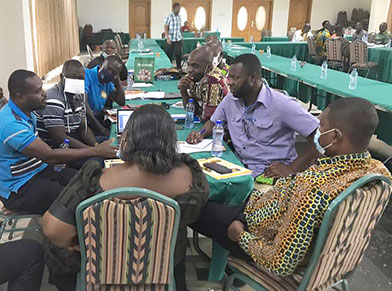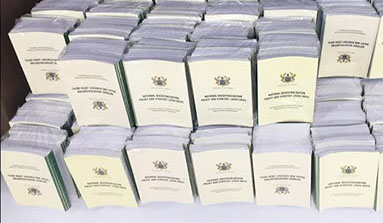Annual Update 2021 VNG International

Regional workshop in Kumasi on Popular Participation.
The National Framework for Popular Participation (2020-2024) and Practitioners’ Manual were formulated in a participatory manner. The project supported the organisation of consultative events involving close to 300 participants drawn from all sixteen regions.

National Decentralisation Policy and Strategy (NDPS, 2020-2024)
DTAP supported the process of formulating a new NDPS (2020-2024), here ready for distribution. The new Decentralisation Policy is evidence-based and provides clear and relevant objectives to achieve quality service delivery through a democratic decentralised local governance system and active citizens’ participation.
‘Local Economic Development is critical to unlock the potential of localities, to harness local resources and improve the quality of life. Popular participation is at the heart of inclusive decision making. It is fundamental to the democratic process of engaging people in identifying, deciding, planning, implementing and monitoring socio-economic development initiatives that affect their lives. Both concepts are key-factors of successful decentralisation policy reforms fully in line with the Leave-No-One-Behind agenda.’
Mr. Kurt Petit,
Key Expert on Local Economic Development, DTAP project
building more effective public administration by strengthening democratic local government
Featured Project
Ghana, Technical Assistance to the Inter-Ministerial Coordinating Committee on Decentralisation (DTAP)
The DTAP Project, financed by the European Union (EU), was implemented from 2018-2020 by a consortium of Ecorys, MAPLE Consult and VNG International. As part of a Sector Wide Approach to decentralisation, agreed between the Government of Ghana and twelve development partners in 2016, the EU supports the implementation of the Ghanaian National Decentralisation Policy Framework (NDPF) in three priority areas:
- Administrative, legal and institutional reforms;
- Capacity building of local authorities (Metropolitan, Municipal, District Assemblies);
- Local service delivery. Next to budget support, the EU provided complementary technical assistance through the DTAP project.
Results achieved:
- An improved policy environment for the implementation of decentralisation policies. The project helped to establish a National Decentralisation Policy and Strategy (NDPS) including its projected budget; an updated Local Economic Development (LED) Policy and Action Plan; an updated National Framework for Popular Participation and a Practitioner’s Manual; and the development of instructions for a revised Civil Service Act. These policy documents have been officially adopted by the government of Ghana by the end of the project.
- Enhanced capacities of Ministries, Departments, Agencies, and Metropolitan, Municipal and District Assemblies (MMDAs). Sustainable contributions by the project include the development and distribution of four organisational manuals for decentralised departments as well as guidelines to prepare future organisational manuals; the publication of 25 quality assured models as part of the curriculum for the Schemes of Services for the Local Government Service, by the Institute of Local Government Studies; the drafting of a LED Practitioners’ Manual; expert recommendations to enhance Ghana’s Public-Private Partnership (PPP) Policy; and a diagnostic study on the use of PPP at the MMDA level.
- Important steps towards fiscal decentralisation by firmly anchoring this in the National Decentralisation Policy and Strategy, and by providing support to the development of the Intergovernmental Fiscal Framework (IGFF). Sustainability of results was anchored in the capacity building of the Fiscal Decentralisation Unit staff on undertaking in-depth analyses on the status of fiscal decentralisation. The project contributed to this field, among other, by developing a Diagnostic Fiscal Decentralisation Report; by reviewing the implementation of the IGFF; and through the development of a zero draft of the new IGFF (2020-2024).
Looking ahead, the DTAP project provided observations and recommendations concerning the ongoing implementation of National Decentralisation Policy and Strategy 2020-2024. There is reason for optimism that the process of decentralisation in Ghana can move forward with increased pace and dynamics.